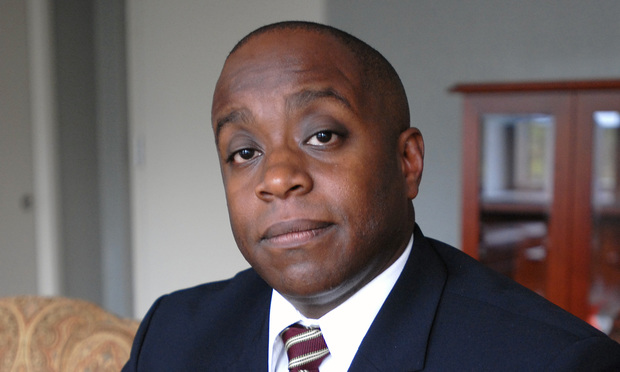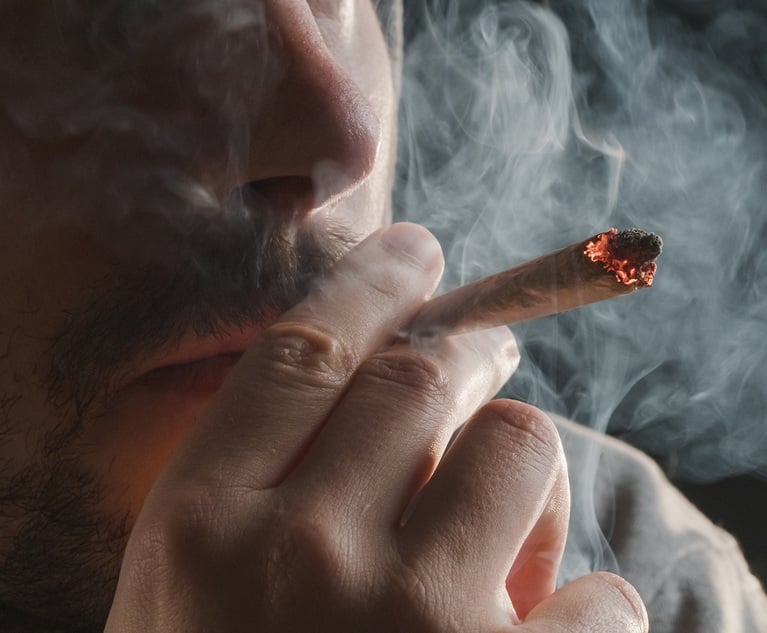Public Defenders Blast Ruling Allowing In-Person New York City Criminal Court Appearances
The ruling, by U.S. District Judge Andrew L. Carter Jr. of the Southern District of New York, denied a preliminary injunction to halt the courts' reopening until the Office of Court Administration implemented a new plan that made accommodations for medically at-risk staff and defendants, including video and telephonic hearings.
July 29, 2020 at 02:18 PM
4 minute read
The original version of this story was published on New York Law Journal
 Judge Andrew Carter Jr. (Photo: Rick Kopstein/ ALM)
Judge Andrew Carter Jr. (Photo: Rick Kopstein/ ALM)
A group of New York City public defender organizations are opposing a federal judge's ruling Tuesday to allow state courts to reopen for in-person proceedings, saying the decision put their clients at "enormous risk" during the COVID-19 pandemic.
The ruling, by U.S. District Judge Andrew L. Carter Jr. of the Southern District of New York, denied a preliminary injunction to halt the courts' reopening until the Office of Court Administration implemented a new plan that made accommodations for medically at-risk staff and defendants, including video and telephonic hearings.
Carter, however, said the request amounted to an impermissible and "ongoing federal audit of state criminal proceedings" that would require "significant intrusion" into the courts' functions.
"This court does not, and indeed cannot, dictate if, when, and how state criminal courts reopen or schedule in-person appearances. To do so would violate fundamental principles of comity and federalism, and would result in federal supervision of state procedures and proceedings," Carter wrote in a 16-page opinion.
"Without adjudicating the merits of plaintiffs' claims, the court concludes that pursuant to Supreme Court and Second Circuit case law, it must abstain from deciding this action," he said.
The public defender groups, which included Legal Aid Society, Brooklyn Defender Services, the Bronx Defenders, New York County Defender Services, Neighborhood Defender Service of Harlem and Queens Defenders, said in a statement that the decision would particularly impact low-income clients of color and people with disabilities.
"The decision by the Southern District of New York to allow this unlawful plan to continue violates our clients' rights and exposes the public to unnecessary risk," the statement said. "We will explore the options available to prevent further harm."
"We are disappointed that the Southern District of New York allowed OCA to continue down this reckless road," the groups said.
A spokesman did not respond to inquiries Wednesday on possible plans to appeal the ruling or to seek a resolution outside of the litigation.
The organizations had said they were surprised by Chief Administrative Judge Lawrence Marks' July 9 announcement that some in-person proceedings would resume in the city as the court system entered Phase Three of its reopening plan. The lawsuit, filed July 14 in Manhattan federal court, alleged violations of Title II of the Americans with Disabilities Act.
The OCA and Marks said the plan was necessary to jump-start court cases that were abruptly paused by the pandemic in mid-March. According to the courts, the disruption caused a backlog of 39,000 cases and 12,000 unindicted felonies, a number that had increased 42% in just four and a half months.
In his ruling, Carter said an order halting the courts' reopening would require an order banning state court judges from scheduling in-person appearances, as well as ongoing supervision of a new policy, which would "squarely" impact state criminal proceedings.
"This relief would then need to be supervised and enforced by this court. This degree of intrusion constitutes an impermissible, 'ongoing federal audit of state criminal proceedings,'" he said.
An OCA spokesman said Thursday that the office was "pleased with Judge Carter's decision allowing us to continue our deliberate, measured and careful resumption of in-person appearances."
"To date, we have had more than 800 in-person appearances in New York City Criminal Court alone, furthering our goal of the continued resumption of operations reflecting a criminal justice system that is safe, secure and engenders confidence for all users," he said.
READ MORE:
New York City Defenders Sue Court Administrators Alleging Reopening Is Causing Bias Against Disabled
Public Defenders Call on NY Courts to Reconsider In-Person Appearances During Reopening Process
This content has been archived. It is available through our partners, LexisNexis® and Bloomberg Law.
To view this content, please continue to their sites.
Not a Lexis Subscriber?
Subscribe Now
Not a Bloomberg Law Subscriber?
Subscribe Now
NOT FOR REPRINT
© 2025 ALM Global, LLC, All Rights Reserved. Request academic re-use from www.copyright.com. All other uses, submit a request to [email protected]. For more information visit Asset & Logo Licensing.
You Might Like
View All

4th Circuit Upholds Virginia Law Restricting Online Court Records Access
3 minute read
'Better of the Split': District Judge Weighs Circuit Divide in Considering Who Pays Decades-Old Medical Bill

Ill. Class Action Claims Cannabis Companies Sell Products with Excessive THC Content
4 minute readLaw Firms Mentioned
Trending Stories
- 1Law Firms Report Wide Growth, Successful Billing Rate Increases and Less Merger Interest
- 2CLOs Face Mounting Pressure as Risks Mushroom and Job Duties Expand
- 3X Faces Intense Scrutiny as EU Investigation Races to Conclusion & Looming Court Battle
- 4'Nation is in Trouble': NY Lawmakers Advance Bill to Set Parameters for Shielding Juror IDs in Criminal Matters
- 5Margolis Edelstein Broadens Leadership With New Co-Managing Partner
Who Got The Work
J. Brugh Lower of Gibbons has entered an appearance for industrial equipment supplier Devco Corporation in a pending trademark infringement lawsuit. The suit, accusing the defendant of selling knock-off Graco products, was filed Dec. 18 in New Jersey District Court by Rivkin Radler on behalf of Graco Inc. and Graco Minnesota. The case, assigned to U.S. District Judge Zahid N. Quraishi, is 3:24-cv-11294, Graco Inc. et al v. Devco Corporation.
Who Got The Work
Rebecca Maller-Stein and Kent A. Yalowitz of Arnold & Porter Kaye Scholer have entered their appearances for Hanaco Venture Capital and its executives, Lior Prosor and David Frankel, in a pending securities lawsuit. The action, filed on Dec. 24 in New York Southern District Court by Zell, Aron & Co. on behalf of Goldeneye Advisors, accuses the defendants of negligently and fraudulently managing the plaintiff's $1 million investment. The case, assigned to U.S. District Judge Vernon S. Broderick, is 1:24-cv-09918, Goldeneye Advisors, LLC v. Hanaco Venture Capital, Ltd. et al.
Who Got The Work
Attorneys from A&O Shearman has stepped in as defense counsel for Toronto-Dominion Bank and other defendants in a pending securities class action. The suit, filed Dec. 11 in New York Southern District Court by Bleichmar Fonti & Auld, accuses the defendants of concealing the bank's 'pervasive' deficiencies in regards to its compliance with the Bank Secrecy Act and the quality of its anti-money laundering controls. The case, assigned to U.S. District Judge Arun Subramanian, is 1:24-cv-09445, Gonzalez v. The Toronto-Dominion Bank et al.
Who Got The Work
Crown Castle International, a Pennsylvania company providing shared communications infrastructure, has turned to Luke D. Wolf of Gordon Rees Scully Mansukhani to fend off a pending breach-of-contract lawsuit. The court action, filed Nov. 25 in Michigan Eastern District Court by Hooper Hathaway PC on behalf of The Town Residences LLC, accuses Crown Castle of failing to transfer approximately $30,000 in utility payments from T-Mobile in breach of a roof-top lease and assignment agreement. The case, assigned to U.S. District Judge Susan K. Declercq, is 2:24-cv-13131, The Town Residences LLC v. T-Mobile US, Inc. et al.
Who Got The Work
Wilfred P. Coronato and Daniel M. Schwartz of McCarter & English have stepped in as defense counsel to Electrolux Home Products Inc. in a pending product liability lawsuit. The court action, filed Nov. 26 in New York Eastern District Court by Poulos Lopiccolo PC and Nagel Rice LLP on behalf of David Stern, alleges that the defendant's refrigerators’ drawers and shelving repeatedly break and fall apart within months after purchase. The case, assigned to U.S. District Judge Joan M. Azrack, is 2:24-cv-08204, Stern v. Electrolux Home Products, Inc.
Featured Firms
Law Offices of Gary Martin Hays & Associates, P.C.
(470) 294-1674
Law Offices of Mark E. Salomone
(857) 444-6468
Smith & Hassler
(713) 739-1250








